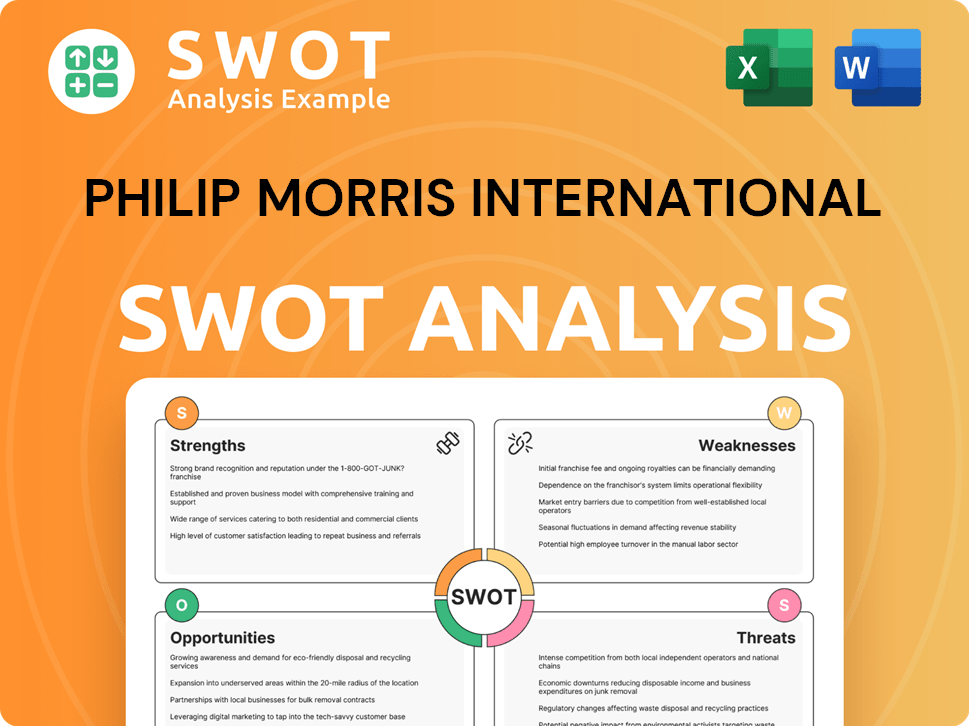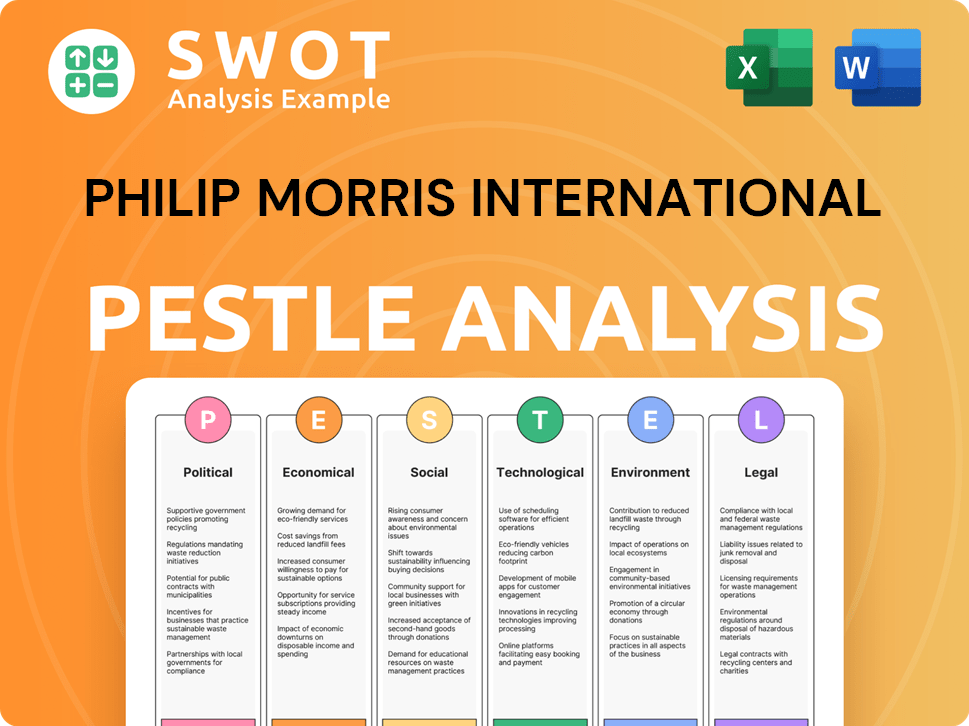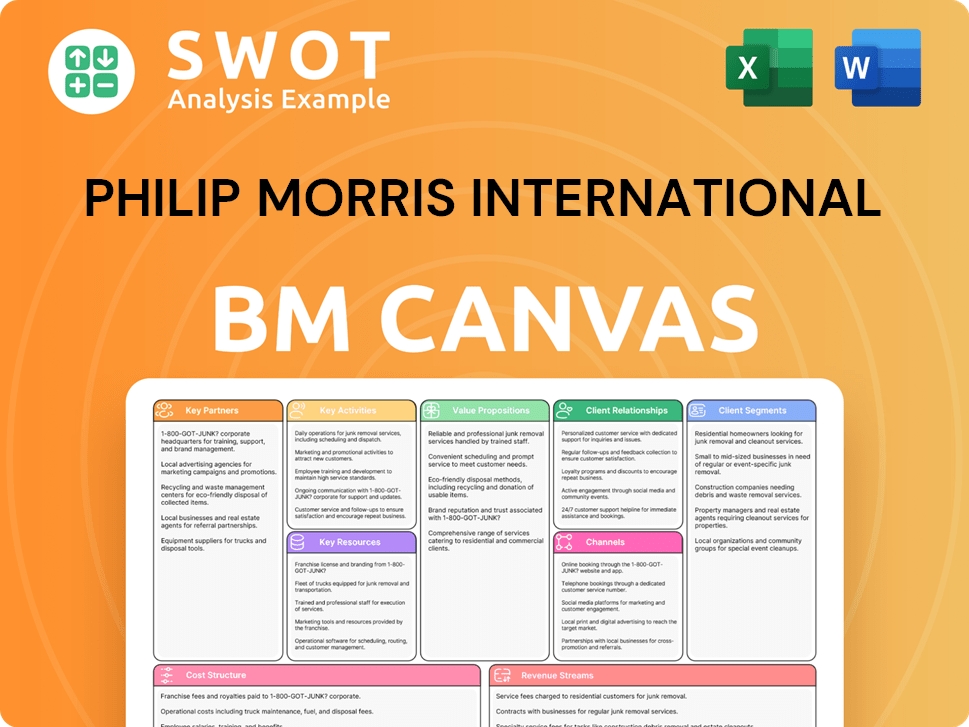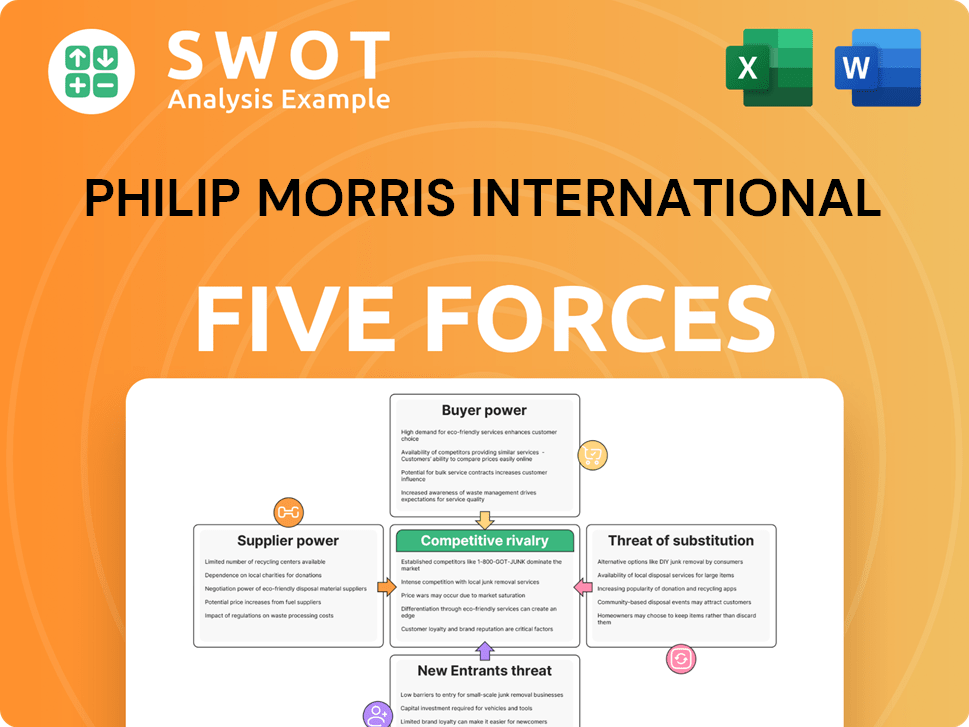Philip Morris International Bundle
Can Philip Morris International Maintain Dominance in a Smoke-Free World?
The Philip Morris International SWOT Analysis reveals a company at a crossroads, aggressively transforming its business model. This transformation, driven by a shift towards smoke-free alternatives, is reshaping the PMI competitive landscape. Understanding this evolution is crucial for anyone seeking to navigate the complexities of the global tobacco market.

This comprehensive analysis of the Philip Morris International delves into the company's strategic pivots, exploring its market share and examining key competitors. We'll dissect its innovative approaches, including its strategies for market dominance, and assess the impact of regulations on its operations. Furthermore, we will provide insights into PMI's global market presence, helping you understand its financial performance and the challenges it faces within the dynamic Tobacco industry analysis.
Where Does Philip Morris International’ Stand in the Current Market?
Philip Morris International (PMI) maintains a robust market position within the global tobacco industry. The company is a significant player in the international tobacco market, consistently ranking among the top companies by market capitalization and sales volume. PMI's operations are undergoing a strategic shift, with a strong focus on smoke-free products to adapt to changing consumer preferences and regulatory environments.
The company's financial performance reflects its substantial scale and global reach. In 2023, PMI reported net revenues of approximately $35.2 billion, demonstrating its financial strength. PMI's market share is influenced by its ability to innovate and adapt, particularly in the smoke-free product category. The company's strategic focus on smoke-free products is evident in its financial results, with this segment contributing significantly to its revenue.
PMI's strategic rebalancing of its product lines is a key aspect of its market position. The company is investing heavily in research and development for smoke-free alternatives, such as heated tobacco products like IQOS, and oral nicotine products. This strategic move is designed to transition adult smokers to reduced-risk alternatives and secure its market position in the long term. The company's ability to navigate regulatory challenges and adapt to consumer preferences is critical to its continued success.
PMI consistently ranks among the top international tobacco companies. The company's leadership is anchored by brands like Marlboro, a globally recognized cigarette brand. PMI's market share is a key indicator of its competitive strength in the global tobacco market.
In 2023, PMI's net revenues reached approximately $35.2 billion. This financial performance demonstrates the company's substantial scale and global reach. The financial data underscores PMI's ability to generate significant revenue within the tobacco industry.
Smoke-free products accounted for 36.4% of PMI's total net revenues in Q1 2024. This demonstrates the increasing importance of this segment for PMI. The company's focus on smoke-free products is a key element of its strategy.
PMI operates in over 180 markets outside the United States. It has significant strongholds in Europe and Asia. This extensive reach allows PMI to cater to diverse customer segments.
PMI's strategic shift towards smoke-free products is a significant element of its market strategy, aiming for a smoke-free future. This involves substantial investments in research and development and targeted marketing to transition adult smokers. PMI's market position is influenced by the adoption of its smoke-free products, such as IQOS, in various markets.
- PMI's competitive landscape involves adapting to evolving consumer preferences.
- The company's financial performance is closely tied to its ability to innovate.
- PMI's global market presence is a key factor in its overall strategy.
- The impact of regulations is critical for the company's long-term success.
Philip Morris International SWOT Analysis
- Complete SWOT Breakdown
- Fully Customizable
- Editable in Excel & Word
- Professional Formatting
- Investor-Ready Format

Who Are the Main Competitors Challenging Philip Morris International?
The PMI competitive landscape is shaped by a complex interplay of traditional and emerging product categories. The company faces significant competition in both its established cigarette business and the rapidly growing smoke-free product sector. Understanding the key players and their strategies is crucial for assessing PMI's market position and future prospects. This tobacco industry analysis highlights the major competitors and the dynamics influencing the global tobacco market.
Philip Morris International (PMI) operates in a dynamic environment, with competitors constantly vying for market share. The company's success depends on its ability to innovate, adapt to changing consumer preferences, and navigate complex regulatory landscapes. The competitive pressures are particularly intense in the smoke-free product segment, where PMI's IQOS faces challenges from various rivals.
The global tobacco market is dominated by a few major players, each with its own strengths and strategies. These companies compete on factors like brand recognition, product innovation, distribution networks, and pricing. PMI's ability to maintain its competitive edge depends on its ability to anticipate market trends and respond effectively to the actions of its rivals. For a deeper dive, explore the Marketing Strategy of Philip Morris International.
In the traditional cigarette market, PMI's most significant competitors include British American Tobacco (BAT), Japan Tobacco International (JTI), and Imperial Brands.
BAT, with brands such as Lucky Strike and Camel (outside the US), is a major global competitor. BAT has also invested heavily in new categories, including Vuse vapor products and Glo heated tobacco.
JTI, known for Winston and Camel (in some markets), maintains a strong presence, particularly in Europe and Asia. They offer their heated tobacco product, Ploom.
Imperial Brands, with brands like Davidoff and Gauloises Blondes, focuses on specific market niches. They also have a growing next-generation product portfolio.
The smoke-free product market is rapidly intensifying, with established tobacco companies and new players competing for market share. BAT's Vuse and Glo, and JTI's Ploom, directly compete with PMI's IQOS and ZYN (oral nicotine).
The e-vapor market sees competition from numerous independent e-liquid and device manufacturers, often at lower price points.
The competitive landscape is shaped by regulatory approvals, product innovation, and consumer adoption rates. Mergers and acquisitions, such as PMI's acquisition of Swedish Match in 2022, reshape competitive dynamics.
- Heated Tobacco: The race for market share in heated tobacco, particularly in key markets like Japan and Europe, is a major competitive front.
- Oral Nicotine: Companies like Swedish Match (now part of PMI) and other independent brands offer alternatives to traditional smokeless tobacco.
- Market Consolidation: Mergers and acquisitions consolidate market power and expand product portfolios.
- Innovation: Continuous product innovation is crucial for maintaining a competitive edge.
- Regulatory Environment: Regulatory approvals significantly impact market access and product sales.
Philip Morris International PESTLE Analysis
- Covers All 6 PESTLE Categories
- No Research Needed – Save Hours of Work
- Built by Experts, Trusted by Consultants
- Instant Download, Ready to Use
- 100% Editable, Fully Customizable

What Gives Philip Morris International a Competitive Edge Over Its Rivals?
Understanding the PMI competitive landscape requires a deep dive into its strengths. Philip Morris International has cultivated several key advantages that set it apart in the global tobacco market. These advantages are especially crucial as the company navigates its transition toward a smoke-free future.
One of the most significant advantages for Philip Morris International is its extensive global distribution network. This network spans over 180 markets, allowing for efficient distribution of both traditional cigarettes and smoke-free products. This reach contributes to significant economies of scale in manufacturing, procurement, and marketing, which smaller competitors struggle to match.
Another key factor is strong brand equity, particularly with brands like Marlboro. This brand recognition provides a solid foundation for cross-selling new smoke-free products and maintaining market share. Furthermore, the company has invested heavily in proprietary technologies and intellectual property related to its smoke-free products, such as IQOS, creating a barrier to entry for competitors.
Philip Morris International operates in over 180 markets worldwide. This extensive reach allows for efficient distribution and significant economies of scale. This network is a key component of PMI's strategy for market dominance.
Brands like Marlboro provide a strong foundation for PMI competitive landscape. Brand recognition and loyalty support the introduction of new smoke-free products. This brand strength helps maintain a strong position in the global tobacco market.
Philip Morris International invests heavily in research and development. This focus is particularly evident in its smoke-free product portfolio, such as IQOS. This commitment to innovation is crucial for long-term success.
The company's strategic focus on a smoke-free future is a significant competitive advantage. This proactive approach allows PMI to shape the evolving regulatory and consumer landscape. This focus positions PMI as a leader in harm reduction.
Philip Morris International leverages several key advantages in the competitive landscape. These include a vast global distribution network, strong brand recognition, and significant investment in smoke-free products. These advantages are critical for maintaining and growing PMI market share worldwide.
- Extensive global distribution network spanning over 180 markets.
- Strong brand equity, particularly with brands like Marlboro.
- Significant investment in research and development for smoke-free products.
- Strategic focus on a smoke-free future and harm reduction.
Philip Morris International faces challenges and opportunities in the evolving tobacco industry analysis. The company's success depends on its ability to maintain its competitive advantages. For more insights into the financial aspects, consider reading about Owners & Shareholders of Philip Morris International. The company's financial performance and strategic moves are essential for understanding its position in the PMI competitive landscape.
Philip Morris International Business Model Canvas
- Complete 9-Block Business Model Canvas
- Effortlessly Communicate Your Business Strategy
- Investor-Ready BMC Format
- 100% Editable and Customizable
- Clear and Structured Layout

What Industry Trends Are Reshaping Philip Morris International’s Competitive Landscape?
The Philip Morris International (PMI) competitive landscape is currently defined by a dynamic global tobacco market. The industry is undergoing significant transformation, driven by evolving consumer preferences, stringent regulations, and the rise of smoke-free alternatives. PMI's strategic focus is shifting towards reduced-risk products, which presents both opportunities and challenges in a market increasingly shaped by health consciousness and technological advancements.
Navigating this environment requires PMI to adapt its strategies continuously. The company's ability to innovate, manage regulatory hurdles, and effectively compete with both traditional and new market entrants will determine its future success. Understanding the PMI competitive landscape involves analyzing its market share, competitor strategies, and the impact of global trends on its financial performance.
The tobacco industry is experiencing a significant shift towards smoke-free products. This trend is fueled by increasing consumer demand for reduced-risk alternatives and stricter regulations on traditional cigarettes. The growth of the e-cigarette and heated tobacco product (HTP) categories is reshaping the market landscape.
PMI faces several challenges, including declining demand for traditional cigarettes in developed markets and intense competition in the smoke-free segment. Regulatory pressures, such as plain packaging and menthol bans, continue to impact the traditional cigarette business. The illicit tobacco trade remains a persistent threat.
Significant growth opportunities exist for PMI in emerging markets, where smoking rates are still high and awareness of smoke-free alternatives is increasing. Product innovation and strategic partnerships can drive further expansion. The company's focus on smoke-free products, like IQOS, offers a pathway to long-term growth.
PMI is actively investing in its smoke-free portfolio, including IQOS and the acquisition of Swedish Match. It is also focusing on scientific research to support the reduced-risk claims of its products. The company aims for smoke-free products to account for over 50% of its net revenue by 2030.
The PMI competitive landscape is complex, with various factors influencing its performance. Understanding the evolving regulatory landscape, consumer preferences, and technological advancements is crucial. Strategic decisions regarding product innovation, market expansion, and partnerships will be key to PMI's future success.
- Regulatory Environment: Navigating the complex and evolving regulatory landscape is critical for PMI's operations.
- Product Innovation: Continuous innovation in smoke-free products is essential to stay competitive.
- Market Expansion: Expanding into emerging markets provides significant growth opportunities.
- Strategic Partnerships: Collaborations can enhance market reach and product development.
Philip Morris International Porter's Five Forces Analysis
- Covers All 5 Competitive Forces in Detail
- Structured for Consultants, Students, and Founders
- 100% Editable in Microsoft Word & Excel
- Instant Digital Download – Use Immediately
- Compatible with Mac & PC – Fully Unlocked

Related Blogs
- What are Mission Vision & Core Values of Philip Morris International Company?
- What is Growth Strategy and Future Prospects of Philip Morris International Company?
- How Does Philip Morris International Company Work?
- What is Sales and Marketing Strategy of Philip Morris International Company?
- What is Brief History of Philip Morris International Company?
- Who Owns Philip Morris International Company?
- What is Customer Demographics and Target Market of Philip Morris International Company?
Disclaimer
All information, articles, and product details provided on this website are for general informational and educational purposes only. We do not claim any ownership over, nor do we intend to infringe upon, any trademarks, copyrights, logos, brand names, or other intellectual property mentioned or depicted on this site. Such intellectual property remains the property of its respective owners, and any references here are made solely for identification or informational purposes, without implying any affiliation, endorsement, or partnership.
We make no representations or warranties, express or implied, regarding the accuracy, completeness, or suitability of any content or products presented. Nothing on this website should be construed as legal, tax, investment, financial, medical, or other professional advice. In addition, no part of this site—including articles or product references—constitutes a solicitation, recommendation, endorsement, advertisement, or offer to buy or sell any securities, franchises, or other financial instruments, particularly in jurisdictions where such activity would be unlawful.
All content is of a general nature and may not address the specific circumstances of any individual or entity. It is not a substitute for professional advice or services. Any actions you take based on the information provided here are strictly at your own risk. You accept full responsibility for any decisions or outcomes arising from your use of this website and agree to release us from any liability in connection with your use of, or reliance upon, the content or products found herein.